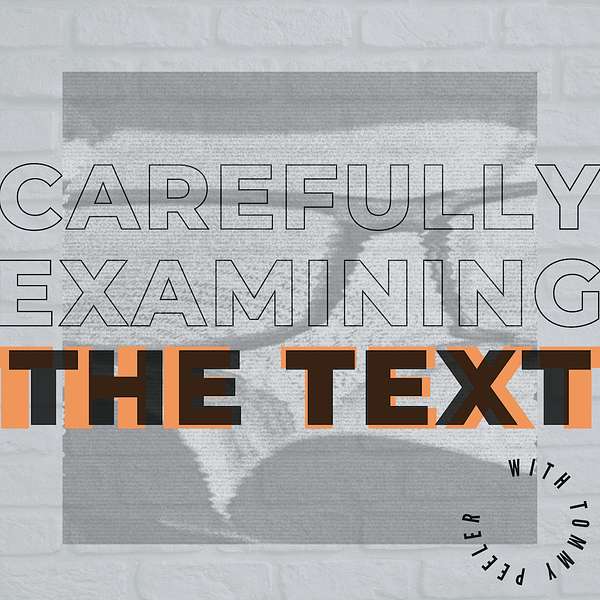
Carefully Examining the Text
Carefully Examining the Text
Psalm 110 Part 2
“In the second century, Jewish teachers applied it to Hezekiah (Justin Martry, Dialogue with Trypho, 33, 83)” Lewis, Matthew 14-28; 108.
110:1 seems quoted or alluded to in Matt. 26:63-64; Mark 16:19; Acts 2:34-35; 5:30-32; 7:55-56; Rom. 8:34; I Cor. 15:25; Eph. 1:20; Col. 3:1; Heb. 1:3, 13; 8:1; 10:12-13; 12:2; I Peter 3:22.
Lessons from this section Mark 12:35-37 paralleled by Matthew 21:41-46; Luke 20:41-44
“Psalm 110 is the psalm most frequently quoted and alluded to in the New Testament. See also Matt. 22:44; 26:64; Mark 14:62; (16:19); Luke 20:42-43; 22:69; Acts 2:34-45; Romans 2:5; 8:34; 11:29; I Cor. 15:25; Eph. 1:20; Col. 3:1; Heb. 1:3; 5:6, 10; 6:20; 7:3, 11, 15, 17, 21; 8:1; 10:12-13; 12:2” Brooks, Mark, 200. Psalm 110:1 is quoted 14 times in the NT- NICOT, Psalms, 838.
What are we told about Psalm 110, from Mark 12:35-37; Matt. 22:41-46; Luke 20:41-44?
1. David is the author of Psalm 110- Jesus affirms this in Mark 12:36, 37- αυτος Δανιδ- David himself. The same point is made in Matt. 22:43 and Luke 20:42. “Jesus first affirmed the Davidic authorship of Ps. 110, something that is usually denied by modern scholarship” Brooks, Mark, 200.
2. David speaks by inspiration- In Mark 12:36 εν τω πνευματι τω αγιω- in the Holy Spirit. Matt 22:43 says, “in the Spirit.”
These are not simply David’s words but God’s words. The same point is made about David and the Psalms in Acts 1:16; 4:25-26. “Jesus attributes a statement of Psalm 110:1 to David, inspired by the Spirit (cf. II Sam. 23:2)” Lewis, Matthew, 107.
3. Psalm 110 speaks of the Messiah- David himself calls Him- Mark 12:37; also see Matt. 22:43; Luke 20:44.
This interpretation of Psalm 110 is assumed as common ground between Jesus and the scribes- Mark 12:35; and Pharisees- Matt. 22:41.
Acts 2:33-35 quotes Psalm 110:1 and stresses that is not David who ascended into heaven but that this is fulfilled in the Messiah/ the Christ.
4. The Messiah is David’s Lord- David himself calls Him “Lord”- Mark 12:37; see also Matt. 22:44; Luke 20:44.
The OT gives abundant evidence that the Messiah will be of the line of David- II Sam. 7:11-16; 22:51; Psalm 18:50; Isaiah 9:6-7; 11:1-9; 16:5; Jer. 23:5-6; 30:8-9; 33:15, 17, 22; Ezek. 34:23-24; 37:24; Hosea 3:5; Amos 9:11. The gospel of Matthew especially emphasizes Jesus as the Son of David- Matthew 1:1; 9:27; 12:23; 15:22; 20:30-31; 21:9, 15.
The point is not to deny that the Messiah is the “son of David” but to state that answer is incomplete. He is both David’s son and David’s Lord. “The startling fact that David spoke of a king as ‘my lord’ was pointed out by Christ, who left His hearers to think out its implications, and His apostles to spell them out” Kidner, 393.
“The first Lord is God; the second is the Messiah. In Greek speech the slave described his master as my lord: the underling described his superior in the same way. The king, however, is at the top of the ladder. Whom could he describe in the phrase? A father does not address his son as ‘my Lord.’ The figure David addressed must be his superior; how then is He David’s son? None could answer. Nor is there an answer short of a knowledge of the divine nature of the Messiah of which they know nothing” Lewis, 107-108.
5. Psalm 110 expresses the relationship between the LORD/God and the Messiah/Christ
The Messiah is a distinct “person” from the LORD- Mark 12:36; Psalm 110:1 “The LORD- YHWH- said to m